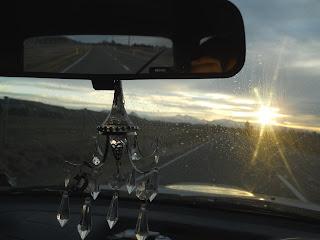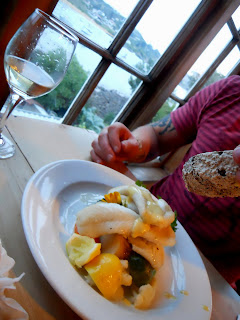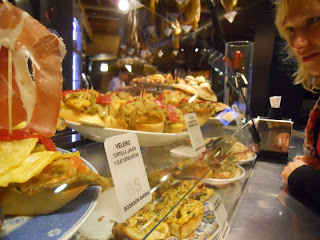In October, when the weather was cooling and the trees below Tioga Pass were goldening, and my season of flipping French toast in the Sierra was over, Kelli Ramsay and I packed up her Subaru with duvets, Trader Joe’s cloth grocery bags, Beach Body workout DVDs, her massage table, and a box of her dad’s favourite Louis L’Amour paperbacks and headed to east San Diego county to go apple picking.
Knowing we were broke, Wolf and Meryl had set us up with work near their home where they were two of five people who lived in community on an orchard in the mountains outside the town of Julian, in a big house with a library and a record player with a vinyl collection and a wrap-around veranda.
Every fall their neighbours and friends from all over California would come to this house for Applepalooza, and sleep in spare rooms, or their campervans, under the stars and the apple trees in the backyard for the 48hours of bonfires, music, firewood chopping, apple pie eating, and cider and homemade wine drinking on the porch steps with the fruit pickers, firemen, weekend nudists, jewellers, cattle ranchers, beer brewers, landscape artists and science teachers; people with both feet planted in this mountain town wedged between the coast and the desert; people who would rather lose their homes for a second or third time rather than pack up and leave.
Eight years before, when I was living in an apartment in Ocean Beach, I woke up, well past 9 in the morning, to a dark bedroom. When I went to the windows and pulled back the curtains to the pier and the ocean, the ash was falling like snow, blanketing the cars in the supermarket parking lot across the street; the sun behind the sky of dark was a giant blood blister and houses and barns and entire lives eaten up by the wildfires to the east just kept falling all over the beaches, turning the water to waves of black silt washing up on the sand.
Last October, all of that destruction felt buried below young trees and new homes on the hillsides. Kelli and I stayed in a bunk room with a loft on the second floor of the house; I would tiptoe down the staircase at 5:30 and start a pot of coffee and read a hardback book of Steinbeck’s stories from the house library, and try and write a little bit, before my mind woke up and I started censoring myself. At 6:30 I would throw on jeans and a baseball cap and drive out to the orchards as the sun was coming up. If I had time, I’d stop for a last coffee at Julian Coffee Company and wait behind the fire crews, all hovering around the cash register with the
Don’t Blame Me, I voted Willie Nelson bumper sticker and passing around the sports section.
I had my own quad bike that I would putt-putt around on behind two other orchard workers, Carlos and Ricardo. Our English and Spanish was about on the same level, so we picked more than we talked, but when we did, lying in the shade of trees, baseball caps over our faces, swatting away bees, we were reaching deep into our memories for words and phrasing like
missing, and
to leave and not come back. Both men were younger than me and supporting families here and in Mexico, and when I explained that I didn’t have any children, Ricardo sat up and looked at me like I had just pulled up my jeans to show him a fake leg and exclaimed, hands out, wide-eyed, with great tenderness, ‘ What ‘HAPPENED?!!’
The orchard we worked on was owned by Rodger, who raised Arabian horses there for 20 years, until one fell over on him and broke his back, so now he raised and nurtured things that couldn’t break his body - apples, pears, blackberries, honey bees and apricots – which went to people in the city who paid to have boxes of organic fruit and honey with low food miles delivered to their doorsteps.
The week I began, fire crews and engines and helicopters were coming and going for training in the canyon behind Rodger’s orchards where two firemen had been trapped and killed in the fires eight years before. Rodger said this training – and the re-enactment of what had happened - was the first time many of the crew had been back to that canyon. When he mentioned, days later, and in a totally different context, the post-it note one of the fire crew had left on his refrigerator in 2003 (
we’ve done all we can, hope this place is still standing), he paused and dropped his sunglasses over his eyes.
At night, I’d come home with bags of apples and peel off my shoes and jeans stiff with dirt and a sweatshirt covered in burrs by the door. I’d shower and put on a robe, and Kelli would be finishing up with massage clients and both of us would start dinner and talk about the people we had met during the day, and the stories, and we would pause a lot, pushing food around the plate, trying to articulate everything we were seeing and hearing here, as travellers passing through a town.
So when I spotted the I LIVED van cruising around town, looking like something out of the A-Team, I attached it to another survival story from the fires. But Chris – tall, blonde, statuesque; driver of the van, and the queen of Rodger’s apple sorters - long fingers running over the apples, eyes scanning the skins for water marks - took a whole morning to tell me about it, when I got stuck in the sheds on a rainy day.
Two years before, at noon, on a Saturday, driving home from a dress rehearsal for a belly dancing performance, Chris was hit by a drunk driver and in one moment’s collision, crushing and distorting her body, belly dancing became - like riding her horses in the hills, running, cycling; picking up her children and getting up and out of a chair without pain – something in her past.
How she managed to make this tragedy into a stand-up routine while manning the apple polisher was hard to explain, and in no way could I do it justice when I tried retelling it that night to Kelli – you had to have Chris’s height, the wingspan of her arms, the tan San Diegan babe hands on hips when she described the confusion as the ambulance driver on duty that day – who happened to be her ex-husband – suddenly took off running in the direction of the guy in the car behind Chris’s – who happened to be the guy she left her ex-husband for - screaming
I’m going to kill him. He was wrestled to the ground but then let back up when it was clarified he was - more reasonably – only trying to beat his rival to the drunk driver further down the road, who was slouched in his seat telling the cops and rescue crew over and over
just tell her I’m really sorry until the ex reached his destination and this time everyone stepped aside to let him knock the driver back into unconsciousness.
Chris’s choice of attire on her smoking hot body as she was extracted from the car by the men who loved her had since solidified the reference to that accident in the last two years around Julian – in the bar, crew locker rooms, and in parenthesis on local police reports - as the bellydancing fiasco.
The other details that I had to ask to get answers to – how long was the guy sentenced to, what happened to your job, how will the hospital bills get paid, how do you manage chronic pain and then the depression that shadows chronic pain, will it be like this for you forever – wasn’t part of her comedy routine.
I LIVED – written in bold, black all caps across the hood of a van that would now surely be the crumpler, not the crumpled, if life were to deal her another highway face-off - were the two words she roped herself to during the day, keeping her from being pulled into the ocean of pissed-off despair that was always beautiful and inviting, lapping at her fingers, waiting for her. And if she forgot, and began to slip out to sea, there was a whole town of people who had also been through hell, to remind her of what was written on her hood.
On our last weekend, Kelli and I were taken to the desert. Words were surfacing every hour we hiked through mountains with two friends - both naturalists and lovers of the hardened sand and fossils of the Anza Borrego; words like
cruel,
breathtaking, ironic – most of the deaths that do happen in the desert are by drowning – and
fearful; death in some form here – by flash floods, dehydration, or crazy people - felt very sure and inevitable.
Seven hours later I was captivated by the darkness in this place. By the solitude of the back seat of a forerunner, when everyone else was riding in the front; by the sundown on the red canyons around us that were growing monstrous as the night took hold and the stars began appearing; captivated by the heat and one deadly margarita that had left me like this, head back on the seat, the windows down, hair blowing everywhere, the desert wind drying the salt on the skin, thinking that the Black Keys -
see the moon; see the stars; from your lonely seat, in your lonely car - were just about the greatest thing to ever come out of a radio.
I thought about how coming to Julian was a last minute back up plan. How we just rolled into town three weeks before with the tumbleweeds, and now we were leaving – not just with enough money to get us to the next place, but with jacket pockets full of fossilised seashells, mixed CDs of John Prine, David Gilmour, the Black Keys, Gus Van Sant; of Chris’s answer, when I asked how you just going around forgiving things like that -
I just decided early on, how this whole thing needed to be for me; and with this kernel of a thought that someday there would be a house in a town that I would open up to tumbleweed people and be their last-minute back-up plan.
And maybe most valuably, I left with a question: what would I would I have written across the hood?
 Six weeks ago - which was beginning of summer for me - was Boxing Day. I was up with the sun and a box of birds, keys jangling in my hand, down on Oreti Beach before 7 am.
Six weeks ago - which was beginning of summer for me - was Boxing Day. I was up with the sun and a box of birds, keys jangling in my hand, down on Oreti Beach before 7 am.





















